Brandon Stanton's Blog, page 3
October 1, 2023
“I grew up with strangers. I wasn’t even with my parents from...

“I grew up with strangers. I wasn’t even with my parents from first to fifth grade. All the people that were supposed to care for me, and teach me, and guide me, they all failed me. It caused a lot of anger and honestly, a lot of heartbreak. I even wondered if my family was cursed. Like all we do is come into this world and we struggle. From the age of twelve I had to go straight home from school and take care of my baby sister. I was the one making sure she was OK: feeding her, changing her, bathing her. It’s like my life was in shackles. I didn’t even start playing basketball for real until I was sixteen. That was the summer I was like: ‘I’m done. I’m not y’all’s babysitter.’ I started waking up early and going to the park for hours, doing drills. Basketball gave me a sense of control. The more I worked, the better I got, and it was like: ‘Wow. I can really do this.’ It’s like I was finally the one writing my story. I ended up trying out for the school team my senior year: no skills, no talent, just starting to understand the game. But the things I could do, I did better than everyone else: diving for loose balls, grabbing rebounds, and hustling. It was mainly hustle. And I think the coach saw that, or maybe he just felt sorry for me. Because he created an extra spot on the roster just for me. There weren’t even enough uniforms, I had a different uniform than everybody else, and during the away games the crowd would let me know. They let me hear it, but I didn’t care. I was just so happy to be there. I couldn’t shoot, but I’d go one hundred percent on defense. The coach would put me on the other team’s best player. I’d stay right up under his jersey. I’d chase him all over the court. And by the end of the year I was in the rotation. We won the city championship that year. During the final game our starters got off to a slow start, and the coach wanted some energy. So he looked down to the end of the bench and said: ‘Rey, go in.’ Right away I got a steal. The crowd was going wild. Proudest moment of my life. I took it all the way back down the court, and unfortunately, I missed the lay-up. Would have been a perfect ending, but man. I was just way too excited.”
September 30, 2023
“Growing up I was very much in my own head, my own world....
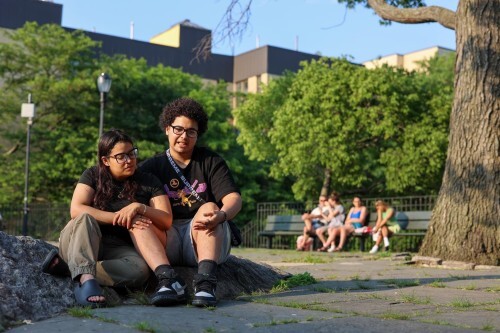
“Growing up I was very much in my own head, my own world. Instead of getting a babysitter my mom would just go to work and leave me at the house. We didn’t have a TV or anything. And when there’s no one to talk to, you just become your own friend. I’d look out the window and try to imagine myself doing things. Like: ‘What would it be like if I was standing on that roof? What sort of things would I see?’ But when you do that too much, at some point you get lost. I didn’t even feel alone. It’s hard to explain, because I haven’t experienced nothing else. But it’s like: you don’t feel lonely if there’s never nobody else there. And there was never nobody else there. Alone was my normal. It was my comfortable. So when we first started dating, I didn’t know what to do. Every time we were alone I would speak non-stop. Then I’d stop myself mid-sentence and be like, ‘Damn. I’m speaking a lot. I need to shut up.’ And she’d be like: ‘No, just keep telling me what you were telling me.’ I was just so excited. I felt like l a kid with a new toy. I’m not calling her a toy, that’s not what I mean. But that’s how I felt. Like I don’t know how this works, but I can’t believe I have it. I’m in love now. For so long I’d told myself: ‘This is never going to happen.’ But then it actually happened. It was like: ‘What do I do? Where do I go now?’ Every day has been something new. Monday feels like Saturday, because every day has meaning. I’m figuring out about her, and about myself, and about the world. Like, I didn’t know you could have fun in winter. There’s so many indoor activities you can do, just simple things. Like wearing matching pajamas on New Years. I never knew about that stuff. It can be so fulfilling. Sometimes you don’t even have to do anything. Just having somebody sitting next to you makes you feel nice inside. And that’s how it is now. That’s how my life is. She’s my comfortable. When she’s not with me, I wish that she was. I feel what it feels to be alone.”
September 16, 2023
(54/54) “I wish I could see it again. Just one more time. I...

(54/54) “I wish I could see it again. Just one more time. I wouldn’t need long. I’d spend a day in Tehran. I’d visit Persepolis, to see the ruins. I’d go to Nahavand, to see my people. To meet their children. And the children of their children. And then I’d go to his tomb. He was buried in his garden. And to stand there one more time, where he tended his trees. Where he sowed his seeds. Seven verses a day. I’d say them quietly in my head, I wouldn’t want to disturb the peace. But something happens, I can’t help it. I feel the heat. I feel the pressure. It’s like a sword pierces my body and I have to let it out: 𝑹𝒂𝒌𝒉𝒔𝒉 𝒓𝒐𝒂𝒓𝒆𝒅 𝒃𝒆𝒏𝒆𝒂𝒕𝒉 𝑹𝒐𝒔𝒕𝒂𝒎! The thunder of hooves, the spark of swords, the clash of axes, the single arrow spinning through the air. Who are these Persians? Rumi, Saadi, Hafez, Khayyam, Ferdowsi. Not even a lion! Not even a lion could stand against them! Our kings. Our queens. Our castles. Our battles. Our banquets. Our songs and celebrations. Our culture. Our wisdom. Our choices. Our story. And our words. All of our words. Words of mothers, words of fathers, words that teach, words that fly, words that cut, words that heal, words laughed, words sung, words wept, words prayed, words whispered in a moonlit garden, words of sin, words kissed, words sighed, words spoken from one knee. 𝘔𝘦𝘩𝘳. Words forgotten. Words remembered again. Words written on a page. Words etched on the face of a tomb. 𝘑𝘢𝘢𝘯. 𝘒𝘩𝘦𝘳𝘢𝘥. A castle of words! That no wind or rain will destroy! Who we were. Who we were! But also, who we wanted to be. We begin in darkness. A siren screams. A knight appears. A knight with the heart of a lion. A knight with a voice to make, the hardened hearts of warriors quake. A knight who rode out to face the enemy alone, and she roared. She roared! She roared at the enemy lines! Here! Here is your champion! Her wisdom, her soul, her voice, her faith, her power, her heart, her passion, her sin, her choice, her life, her fight, her fire, her fury, her justice! And her hair. Hair like a waterfall. Hair like silk. Hair like night. Hair worthy of a crown. 𝘈𝘻𝘢𝘥𝘪. All of Iran, in a single poem.”
آرزو دارم بار دیگر آن را ببینم. برای یکبار هم که شده. کوته زمانی شاید. یک روز هم در تهران بمانم. سپس به تختجمشید بروم، ویرانههای پرشُکوهش را دیدار کنم. آنگاه سری به نهاوند بروم، با سر بروم، برای دیدن زادگاهم. دیدن مردمانش. دیدن فرزندان و فرزندانِ فرزندانشان. سپس به آرامگاهاش خواهم رفت. در باغاش که خاک پاک اوست. یک بار دیگر آنجا بایستم که او درختاناش را میپروراند. زمینی که دانههایش را در آن میکاشت. هفت بیت شعر میانگین هر روزش را میسرود. سرودههایش را به آرامی در دل و جانم زمزمه کنم. آرامش آنجا را به هم نخواهم زد. بیگمان از درونم احساسی میجوشد، جلویش را نتوانم گرفت. گرمایش را، فشارش را احساس میکنم. شمشیری تنم را میشکافد، فریادم را فرو میخورم: از این سو خُروشی بر آورد رَخش / وزآن سوی اسب یل تاجبخش! پژواک سُم اسبها، درخشش شمشیرها، چکاچاک تبرها، و چرخش تکتیری در آسمان بلند. کیانند اینان، ایرانیان؟ مولانا، سعدی، حافظ، خیام، فردوسی. دل شیر در جنگشان اندکیست! شاهانمان. شهبانوانمان. کاخهامان. نبردهامان. بزمهامان. سرودها و جشنهامان. پهلوانانمان. فرهنگمان. خردمان. گُزینههامان. داستانمان. و واژگانمان. همهی واژگانمان. واژگان مادران، واژگان پدران، واژگانی که میآموزند، واژگانی که پرواز میکنند، واژگانی که میبُرند، واژگانی که بهبودی میبخشند، واژگان خندان، واژگان سروده شده، واژگان زاری، واژگان نیایش، واژگان نجوا شده در باغ مهتابی، واژگان گناه، واژگان بوسیده شده، واژگان آوخ، واژگان گفته شده بر یک زانو. مهر. واژگان فراموش شده. واژگان یادآوری شده. واژگان نوشته شده بر برگ. واژگان حک شده بر آرامگاه. جان. خرد. کاخی از واژگان! که از باد و باران نیابد گزند! که بودهایم. که بودهایم! و چه میخواستیم باشیم. در تاریکی آغاز میکنیم. بانگ آژیری برمیخیزد. سواری پدیدار میشود. پهلوانی با دل شیر. با خُروشی که دلهای استوار جنگیان را میلرزاند. پهلوانی که به تنها تن خویش به نبرد دشمن میرود. و میخُروشد. میخُروشد! میخُروشد بر صف دشمنان! اینجاست، اینجاست پهلوان شما! خِرد او، جان او، آوای او، ایمان او، نیروی او، دل او، شور او، گُناه او، گُزینهی او، زندگی او، زمان او، نبرد او، آتش او، خشم او. داد او! و گیسوان او. گیسوانی چون آبشار. گیسوانی ابریشمین، گیسوانی چون شب. گیسوانی سزاوار تاج. آزادی. همهی ایران در شعری یگانه
(53/54) “It’s a beautiful word in itself, Mitra. Someone who has...
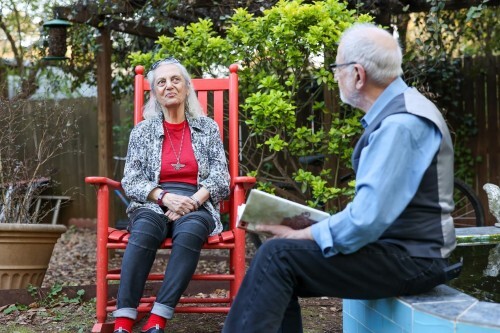
(53/54) “It’s a beautiful word in itself, Mitra. Someone who has no idea of its meaning can appreciate its beauty. Mitra always had a genius for beauty. She knew it completely. She wanted it around her at all times. Even now she keeps a book of Hafez by our bedside. It’s always in reach, and whenever she finds a verse that she loves, she will bring it to me. She still trusts me to find the melody. Poetry is one of the things that she still remembers best. Because poetry is music. It sinks into the memory. Even if you can’t remember a word, the rhythm will guide you. The rhyme will give you a hint. Recently we were reciting a poem from an old book, and one of the words had completely faded. It was a poem that we both used to love. And I was so mad at myself. I kept trying to remember the word, but it would not come to me. Then suddenly she said it. It made me so happy. It doesn’t hurt when she forgets anymore, but it makes me so happy when she remembers. To know that the memory is still inside of her. That she is still holding on. Our lives are just a fistful of memories, ice melting in our hands. And Mitra’s ice is melting faster than mine. But she still has more memories of me than anyone else. And I have a lifetime of memories every time I look at her. And until the last moment, until the last ice has melted, we will still be us. Our entire lives we’ve been on two different roads. But the horizon was always the same. It was an unwritten promise: that no matter what happens, I will keep you. Even when we disagree, I will keep you. From a distance, I will keep you. In the dark, I will keep you. In the deepest pit, I will keep you. Even if you lose your country, even if you lose your eye, even if you lose your memory, I will keep you. We will still be us. It’s the only thing we ever agreed on. We always agreed on us. It’s one of the earliest principles of Iran. It’s where she gets her name. Mitra, the God of Promises.”
میترا واژهای بس زیباست. حتا اگر درونمایهاش را هم ندانیم، زیبایی واژه را درمییابیم. او نبوغ ویژهای در زیباشناسی دارد. به درستی با آن آشناست. دوست داشت پیرامونش همیشه زیبا باشد. هنوز دیوان حافظ را کنار تختش میگذارد. هنوز هرگاه شعری دلپسند از حافظ بیابد، به من میدهد تا برایش بخوانم. هنوز باور دارد که من آهنگ درست شعر را زود پیدا میکنم. اگر نتوانم، یاریام میکند. شعر، یکی از چیزهاییست که هنوز به یاد میآورد. شعر موسیقیست، پر از آهنگ و نواست، در گوشههای مغز جایی دارد. اگر واژه را فراموش کنید، آهنگاش شما را به آن میرساند، راهنماست. چند روز پیش شعری از کتابی کهن را میخواندیم. یکی از واژگان خواندنی نبود. شعری بود که هر دو دوست داشتیم، دلم گرفت، به یادش نمیآوردم، ناگهان او واژه را در جایش نشاند! چه مایه شادمان شدم. فراموشیهای او دیگر مرا نمیآزارند، اما هرگاه چیزی را به یاد میآورد بسیار خُرسند و خُشنود میشوم. میدانم که برخی خاطرهها هنوز در او زندهاند. هنوز آنها را نگهداشته است. زندگی مُشتی خاطره است که مانند یخ در دستهایمان آب میشود. یخهای میترا به آب شدن شتاب بیشتری دارند. او بیش از هر کس دیگری از من خاطره دارد. و من خاطرهی یک عمر زندگی را مُرور میکنم هرگاه به او چشم میدوزم. تا واپسین لحظه، تا واپسین تکهی یخ، با هم خواهیم ماند. همهی زندگیمان، دو تا همراه بودهایم. اما افق و کرانههامان همواره همسو بوده است. کاخی بود پیرامون ما. سوگندی نانوشته: هر آنچه هم که پیش آید، تو را نگه خواهم داشت. هماندیش نباشیم، تو را نگه خواهم داشت. بر بالاترین فرازها، تو را نگه خواهم داشت. در ژرفترین گودالها، تو را نگه خواهم داشت. اگر میهنات را از دست بدهی، اگر چشمات را هم از دست بدهی، حتا اگر حافظهات را از دست بدهی، همچنان تو را نگه خواهم داشت. ما همچنان ما خواهیم بود. این یگانه چیزیست که ما همواره بر سر آن همرای بودیم. این یکی از نخستین آرمانهای ایران بوده است. سرچشمهی نامش. میترا، ایزدبانوی پیمانها
(52/54) “It always sits out on the shelf. It’s given structure...
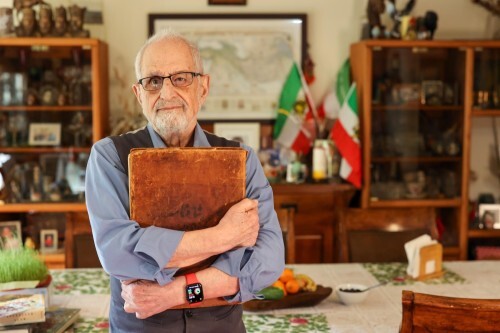
(52/54) “It always sits out on the shelf. It’s given structure to my life. I’ve wanted to be a knight. I’ve wanted to be a king. I’ve wanted to be Ferdowsi, living for higher ideals. But there’s old men in Shahnameh too. And that’s my idea of a king now, a grandfather. A 𝘉𝘶𝘣𝘫𝘢𝘯. He’s more of a cultural figure. He advises his grandchildren. He keeps them together. But he doesn’t participate in their issues, regardless of how they behave. He’s like a book. He’s full of wisdom. He’s there if you need him, but he doesn’t exert power over you. I’m reading it through one last time, with all eight of my grandchildren. It’s a deeper understanding now. To dive deep requires a philosopher’s tenacity, but the pearls are in the depths of the seas. These days I skim over the battle scenes. I read more diligently the parts that tell of universal values like love and kindness. The parts that are true for everyone. One of my favorite stories never made it into Shahnameh. It was passed down through our oral traditions. Iran is in the midst of the longest war it has ever fought. The fighting has gone on for more than a century. Many kings have died, both sides are exhausted, and a truce is proposed. A single champion from the Iranian side is selected. His name is Arash, ‘The Archer.’ He’s told to climb one of the highest mountains in Iran, and to shoot his arrow as far as he’s able. And wherever it lands, that will be the border of the new Iran. He climbs to the mountain’s peak. He pulls back his bow as far as he can, and he lets the arrow fly. It sails across the entire country. And sticks into a walnut tree, exactly where the previous border was before. Before the fighting, before the bloodshed. And that’s the new Iran. But Arash never gets to see it. He put his entire soul into the arrow. All of his 𝘑𝘢𝘢𝘯. And the moment it’s released, he falls over and dies.”
همواره بالای گنجه نمایان است. به زندگیام سامان داده است. میخواستم پهلوان باشم. میخواستم شاه باشم. میخواستم فردوسی باشم، که تنها به آرمانهایش میاندیشد. اما کهنسالان هم در شاهنامه هستند. اکنون برداشتم از شهریار، پدربزرگ است، بابجان است، یک باشندهی فرهنگی. او برای هماندیشی با فرزندان و نوادگانش همواره هست. آنها را همبسته نگهمیدارد. به زندگی روزانهی آنان کاری ندارد، گزینش رفتار و راهکارهایشان با آنهاست. او مانند یک کتاب است. اگر نیاز داشته باشند در دسترس است. اما فشاری بر آنها نیست. برای واپسین بار شاهنامه را با هر یک از هشت نوادگانم میخوانم. اکنون برداشتی ژرفتر دارم. داستانها همیشه برایم دلپذیر بودهاند. همیشه درونمایهی واژگان را به جان گرفتهام. اما غوطهور شدن در ژرفای داستانها نیازمند پیشینه و پشتکار فرزانگان است. مرواریدها در ژرفای دریا نهفتهاند. این روزها از پهنهی نبردهای خونین زودتر میگذرم. بخشهایی را که از ارزشهای جاودانی مردمان در سراسر جهانند، چون عشق و مهربانی، ژرفتر میخوانم، به کار همه می آیند، راستیناند. داستان پرمایه و دلانگیزی در اوستا هست. داستانی که در شاهنامه نیامده است. ایرانیان درگیر جنگی درازدامن با تورانیانند. جنگی که بیش از یک سده به درازا کشیده است. بسیاری از پادشاهان جان باختهاند، هر دو سو خسته و درماندهاند. پیمان میبندند که مرز ایران و توران تیر پرتاب کمانگیری از فراز کوه رویان باشد. از ایران سپاه، آرش است که در این کار سترگ بالا برمیافرازد، جان خود در تیر میکند. تیر بر شاخ گردویی فرود میآید که بر مرز راستین ایرانزمین روییده است! از آرش مگر کمانی باز نمیماند. سیاوش کسرایی چه زیبا سروده است: جان خود در تیر کرد آرش / کار سدها سدهزاران تیغهی شمشیر کرد آرش
(51/54) “It’s coming. In the streets it is silent. But in the...
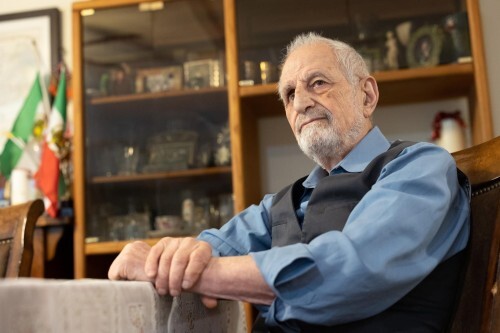
(51/54) “It’s coming. In the streets it is silent. But in the homes, where Iran still lives, the drumbeat is building. The anger is building. The impatience is building, and soon it will come out. Iran will come out. Our young women have been leading us. But we cannot let them march one-by-one into the night. Do not pass by silently if a woman is getting harassed in the street. Do not let them be called whores or sluts. Speak! Say this is not right! Your neighbor will hear you, and they will say it too. Until all of us are saying it together. The only way to take the battlefield is together. Those of us in free societies, with the freedom to speak, and write, and protest. Do not sit behind the walls of your castle. Write. Speak. Protest. We don’t need the same chants, or the same slogans. But let us come together. Even if it’s only around our dining room tables, let us come together. We cannot let them face the enemy alone. In Iran they are standing up: the students of Tehran, the truck drivers of Bandar Abbas, the oil workers of Khuzestan, the factory workers of Pooladshahr, the teachers of Sanandaj, the farmers of Isfahan. Everyone has found their own way of saying: ‘This does not work for us.’ Everyone is choosing their own words, but now let us say them all together. If you can’t find the courage to march in the streets, then just open your doors. Stand on your stoop as the protesters pass. That would be enough. If everyone who is against this regime could only do that, we’d fill all of Iran. It will be the end. These enforcers, these soldiers, these policemen, they will realize. They will finally see: that we are together, and they are alone. There is only one battle left. The fight against fear. When we win against the fear in our hearts, we win Iran. And in the words of Ferdowsi: ‘Without fighting, they will flee the scene.’”
خیابانها آراماند. اما درون خانهها، جایی که ایران هنوز زنده است، بانگ کوسها رساتر میشود. خشمها پدیدار میشوند. ایران رخ مینماید. زنان جوانمان رهبری را بر عهده گرفتهاند. نگذاریم یکایک در تاریکی شب ناپدید شوند. تنها راه پیروزی در میدان نبرد همبستگیست. ما که در جامعههای آزاد زندگی میکنیم و آزادی سخن گفتن، آزادی نوشتن، آزادی گرد هم آمدن داریم. پشت دیوارهاتان نمانید. بنویسید! سخن بگویید! خود را نشان دهید! نیازی نیست که شعارهامان، اعتراضهامان یا سرودهایمان یکسان باشند. بیایید با هم باشیم. حتا اگر پیرامون سفرهمان باشد. بیایید با هم باشیم. نگذاریم به تنهایی با دشمن روبرو شوند! در ایران همه به پا خاستهاند. دانشآموزان تهران. رانندگان کامیونهای بندرعباس. کارگران صنعت نفت خوزستان. کارگران کارخانهی پولادشهر. آموزگاران سنندج. کشاورزان اصفهان. هر کدام راه خود را پیدا کردهاند تا بگویند: “دیگر این برای ما کارآمد نیست.” هر کسی واژگان خود را برمیگزیند، بیایید همآوا و همراه آنرا فریاد بزنیم. خاموش نمانید. بیاراده از کنار زنی که در خیابان آزار میشود، نگذرید. نگذاریم آنها را فاحشه یا هرزه بنامند. سخنی بگویید! بگویید که این کارتان درست نیست! دست از زشتکاریهایتان بردارید! همسایهتان میشنود و او نیز با شما همصدا خواهد شد. تا زمانی که همهی ما همصدا آنرا تکرار کنیم. بیایید با هم باشیم. اگر شجاعت پیوستن به راهپیماییهای خیابانی را ندارید، درِ خانههایتان را بگشایید. جلو در بایستید و تماشاگر حرکت پهلوانانتان باشید. اگر این کار را انجام دهیم، همهی ایران را پُر خواهیم کرد. این نبرد پایانی ماست: نبرد با ترس. هنگامی که بر آن پیروز شویم، ایران از آن ما خواهد شد. هنگامی که ایران بُرون آید، به معنای راستین بُرون آید، به پایان شوربختیها میرسیم. سرکوبگران، پاسدارها، نیروهای انتظامی، همه خواهند دید و خواهند فهمید که ما باهمیم و آنها تنها. همانگونه که فردوسی میگوید: همه جنگ ناکرده، بگریختند / همه دشت، تیر و کمان ریختند
(50/54) “When I was eighty I was giving an interview on Persian...
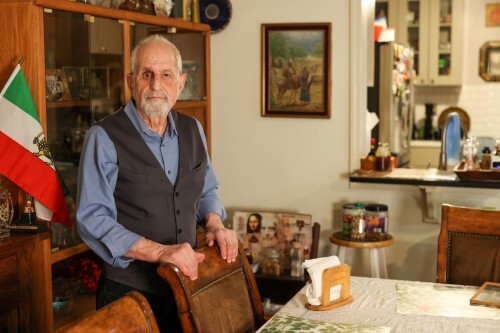
(50/54) “When I was eighty I was giving an interview on Persian television. I wanted to recite a verse, from the part of Shahnameh when Rostam selects Rakhsh as his horse. But no matter how hard I tried, I could not remember the line. For almost a minute I sat still. After that I stopped giving speeches. I’m at a new stage now. I’ve accepted this. It’s like an arrow that’s descending. It’s been a long flight. But it’s nearly reached its destination. I’ve done all I can. So now I try to think through the soul of our people. It’s in the hands of the young people now. They’re the ones with energy. They’re the ones that can change the regime. In the great battles of Shahnameh, as long as the flag is flying high, the army remains strong. The flag must stay raised. When the flag falls, the battle is lost. The flag of this regime is the hijab. For as long as I can remember. For my entire life, it’s the thing they’ve cared about most. It’s something that can be visualized. Something that can be seen from afar. No matter how low they sink, no matter how weak they are, it’s the one proof that they’re still in control. That they still control half of Iran. They’ve made it their flag. But their castle is surrounded. The flag is falling fast. And when it finally hits the ground, the regime will end. Mitra and I do whatever we can to support. We go to the protests. She wears her ‘Woman, Life, Freedom’ hat. She doesn’t remember the exact dates, or the exact events. But she can feel it in the air. She knows something’s coming. She brought home two Mahsa Jina Amini T-shirts from one of the protests. She hung one in our living room, and the other in our bedroom. I can not fight it, her word is law. Lately she has become obsessed with the idea of going back to Iran. She thinks we’re going home. She’s always saying: Where are we going to live? Who are we going to see? It’s not a delusion. The hope is inside her. And is inside of me too. I still hope that I will live to see it. The new Iran. Just a glimpse would be enough for me. As Ferdowsi writes: ‘Even a few drops sipped at the end of evil, is worth more than all the years of life.”
در هشتادسالگی در رسانهای فارسیزبان سخن میگفتم. میخواستم بِیتی از شاهنامه را بخوانم، زمانی که رستم رخش را برمیگزیند؛ نتوانستم آن بیت را به یاد آورم. نزدیک به یک دقیقه خاموش بودم. پس از آن، سخنرانی و مصاحبه را کنار گذاشتم. اکنون در دوران تازهای هستم. این را پذیرفتهام. مانند تیریست که از کمان رها شده و در حال فرود آمدن است. پروازی درازآهنگ بوده و کمابیش به هدف رسیده است. آنچه را در توانم بوده انجام دادهام. در تلاشم تا با جان و روان مردممان بیامیزم. اکنون همه چیز در دست جوانان است. نیرومندان دلیر. آنان میتوانند رژیم را براندازند. در بزرگترین نبردهای شاهنامه، تا زمانی که درفش افراشته باشد، سپاه نیرومند و استوار میماند. درفش باید برافراشته بماند. درفش بر زمین افتاده، نشان آشکار شکست است. درفش این رژیم حجاب است، تا یاد دارم چنین بوده است. تا بتوانند از آن نمی گذرند. دیدنیست. نمادیست که از دوردست پیداست. هر اندازه هم در حال غرق شدن باشند، هر اندازه هم ناتوان شده باشند، این نماد نمایش بودن آنهاست. می پندارند که نیمی از ایرانیان را زیر فرمان دارند. آن را درفش خود کردهاند. روز نبرد فرا رسیده است. کاخشان محاصره شده است. درفش با شتاب در حال افتادن است. هنگامی که سرانجام بر زمین افتد، رژیم نابود خواهد شد. من و میترا به تظاهرات میرویم. او همواره کلاه «زن، زندگی، آزادی»اش را بر سر دارد. شاید تاریخها و مناسبتها را دقیق به یاد نیاورد اما هوای دگرگونی را احساس میکند. دو پیراهن با چهرهی زیبای مهسا ژینا امینی را از تظاهراتی به خانه آورد. یکی را بر دیوار اتاق نشیمن آویخت و دیگری را بر دیوار اتاقمان. و من با او اختلافی ندارم زیرا که سخن او قانون است. تازگی حسی نیرومند برای برگشتن به خانه و میهن دارد. همواره میپرسد: “کجا زندگی خواهیم کرد؟ چه کسانی را خواهیم دید؟ به دیدن چه جاهایی خواهیم رفت؟” این خیال نیست؛ امید در درون او شعلهور شده است و همچنین در جان من. امیدوارم که تا آن روز زنده بمانیم. فردوسی میگوید: دَمی آب خوردن پسِ بدسَگال / به از عُمرِ هفتاد و هشتاد سال
(49/54) “We still take long walks together, even today. There’s...
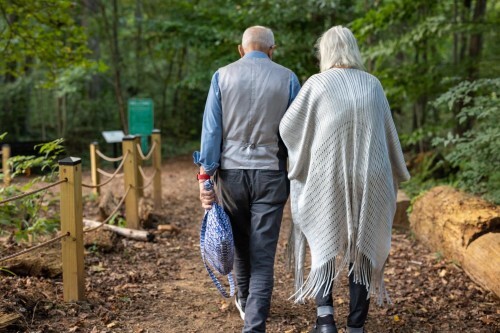
(49/54) “We still take long walks together, even today. There’s a path through the forest near our house. Mitra still can’t stand the silence. She’ll walk off the path so she can hear the dry crunch of the leaves. She still talks the entire time, but these days our conversations don’t reach back as far as they used to. We mainly talk about the things we see. She’ll count her steps, count the houses, count the trees. Mitra’s memory is no longer her friend; it no longer supports her. But she still says ‘hello’ to everyone that she sees. And she’s still a queen, I am always at her service. These days we have become inseparable. If I do not see her for two minutes, I will find what room she’s in. I button her jacket. I tie her shoes. I handle all her medications. I do not grieve the situation. I feel gratitude that I am able to do these things for her, despite nature. My only grief is for her. Her memory was her greatest gift. It’s where I stored my treasures. I could tell her any verse, even once. And she could remember it forever. Now it will escape her after only a minute. Every day her world gets smaller and smaller. Tighter and tighter. It’s the oldest memories that she remembers most now. Recently she has been fixated on her hand. She keeps holding up her crippled hand, and asking: ‘Why did you ever marry me?’ When we were young in Tehran, her father had a tradition. Every morning he would insist on having the first cup of tea. He said it was the one that tasted best. He called it ‘the flower of the tea.’ So now when I brew our tea every morning, I will wait. Until Mitra is up. Until she’s ready. So that I can serve her the flower of the tea. Then as soon as we’ve finished the kettle, she’ll make me go outside. And pour the remains on the roots of our trees.”
ما همچنان با هم به پیادهرویهای درازآهنگ میرویم. راهی جنگلی در نزدیکی خانهمان هست. میترا همچنان خاموشی را برنمیتابد. هنوز به راه رفتن روی برگهای خُشک و شنیدن خِشخِش آنها دلبسته است. هنوز همهی راه را سخن میگوید، اما گفتوگوهای ما به گذشتههای دور بازنمیگردند. این روزها بیشتر دربارهی آنچه میبینیم، سخن میگوییم. او گامهایش را میشمارد، خانهها را میشمارد و درختها را. حافظهی میترا دیگر یاریاش نمیدهد، دوستش نیست، از او کناره گرفته است. ولی هنوز با هر رهگذری که از کنارمان میگذرد، خوشآمد میگوید. او هنوز شهبانوی خانه است و خواهد ماند و تا هستم او را پرستار و خدمتگزار خواهم بود. این روزها ما جداییناپذیریم. اگر برای دو دقیقه او را نبینم، در اتاقها به دنبالش میگردم. دکمههای ژاکت و بند کفشهایش را میبندم. داروهایش را به هنگام به او میرسانم. هرگز برای خودم دل نمیسوزانم. سپاسگزار بختم که میتوانم اين کارها را برای او انجام دهم. برای او اندوهناکم. برجستهترین توانایی او حافظهاش بود. یاد او گنجینهی یادهای من هم بود. میدانستم هر بیتی را یک بار برای او بخوانم، برای همیشه به یاد میسپارد. این روزها پس از دقیقهای از ذهن او میگریزند. دنیایش هر روز کوچک و کوچکتر، تنگ و تنگتر میشود. خاطرههای دوردست را بهتر به یاد دارد. تازگیها به دست چپش میاندیشد. پیوسته دست کمکار خود را بالا نگه میدارد و میپرسد: “به راستی تو چرا با من ازدواج کردی؟” روزگار جوانی که در تهران بودیم، پدرش دوست داشت هر بامداد، نخستین استکان چای را بنوشد، میگفت بهترین است. آن را «گُلِ چای» مینامید. هنگامی که هر بامداد چایمان را آماده میکنم، چشمبهراهش میمانم تا بتوانم با گُلِ چای از او پذیرایی کنم. شبها دست مرا میگیرد تا با هم تَهماندهی چای را پای گلها ودرختان بریزیم
(48/54) “I didn’t raise them to be Iranian first. Above all I...
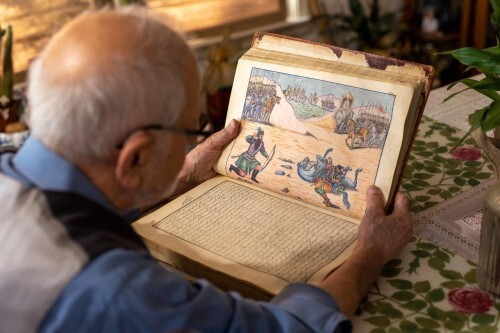
(48/54) “I didn’t raise them to be Iranian first. Above all I wanted them to be good people. I wanted the same things for them that I want for all people: to do the next right thing, to say the next true thing. But they were growing up in tough times. So many bad things were being done in the name of Iranians. I wanted them to know the real Iran. I wasn’t able to bring them there, but I did try to build a little Iran around us. I’ve surrounded us with my memories of home. On the wall hangs a painting of Nahavand that I made in Germany. Above the back door hangs the horns of the first ibex I ever hunted. On the shelf in the dining room is my jar of soil. It was collected from a spot in Nahavand at the base of the mountain, right at the source of the spring. And next to my jar of soil, for anyone who needs it: sits my Shahnameh. As soon as they were old enough I asked each of them to memorize a verse about their namesake. Zaal went first. His namesake was one of the wisest heroes in all of Shahnameh: 𝘡𝘢𝘢𝘭 𝘬𝘯𝘦𝘸 𝘢𝘭𝘭 𝘵𝘩𝘪𝘯𝘨𝘴 𝘨𝘳𝘦𝘢𝘵 𝘢𝘯𝘥 𝘴𝘮𝘢𝘭𝘭, 𝘯𝘦𝘢𝘳 𝘢𝘯𝘥 𝘧𝘢𝘳. 𝘏𝘪𝘴 𝘸𝘪𝘴𝘥𝘰𝘮 𝘴𝘩𝘰𝘯𝘦 𝘢𝘴 𝘪𝘧 𝘢 𝘴𝘵𝘢𝘳. Rostam went next. He chose his verse from a part of Shahnameh when Iran finds itself in a moment of great darkness. Three enemy kings have aligned their forces. Three hundred thousand men march against us. The army is on the brink of defeat. The dirt’s turned clay with blood. Rostam arrives at the battlefield on foot: no horse, no armor, carrying nothing but a bow and arrow. He walks out to face the enemy alone. And with a single shot, he slays the greatest champion on the other side. The enemy is stunned into silence. Their courage flees them. Their commander screams: 𝘞𝘩𝘰 𝘢𝘳𝘦 𝘵𝘩𝘦𝘴𝘦 𝘗𝘦𝘳𝘴𝘪𝘢𝘯𝘴? 𝘕𝘰𝘵 𝘦𝘷𝘦𝘯 𝘢 𝘭𝘪𝘰𝘯 𝘤𝘰𝘶𝘭𝘥 𝘴𝘵𝘢𝘯𝘥 𝘢𝘨𝘢𝘪𝘯𝘴𝘵 𝘵𝘩𝘦𝘮! It’s one of my favorite verses in all of Shahnameh. My entire life, ever since I was a little boy, those have always been my favorite scenes. The ones that make me most emotional. The ones that make my voice break. When at the moment of greatest darkness, one champion makes a stand. And with a single act of courage reveals the soul of an entire people.”
در پرورش نوادگانم نکوشیدم که تنها به ایرانیبودن خود ببالند. میخواستم مردمان خوبی باشند. هر چه برای آنها آرزو می کنم، آرزوی جهانی من هم هست. ویژگیهای فرهنگ ایرانیان جهانگسترانه بودن آن است. راستی را بنیاد زندگی اجتماعی بدانند. با ناراستی نمیتوان دو تن را به هم پیوست. نیک اندیشیدن، نیکخواهانه سخن گفتن و به کارهای نیک که آبادگر جهاناند کوشیدن را به جان دریابند. مردمان ما در روزگار سختی بزرگ میشدند. رویدادهای ناگواری به نام ایرانیان نشان داده میشد. میخواستم ایران راستین را بشناسند. نمیتوانستم آنها را به میهنام ببرم، ولی تلاش کردم ایران کوچکی پیرامون خودمان بسازم. بر روی دیوار نگارههایی از نهاوند است که آن را هنگام زندگی در آلمان کشیدهام. بالای دیوار اتاق، شاخ کَلی که شکار کردم، آویزان است. روی گنجهی اتاق ناهارخوری، شیشهی خاکام را نهادهام ،خاک نهاوند که درست از کوهپایه گردآوری شده است، از سرچشمه. در کنار شیشهی خاکام، برای هر کس بخواهد شاهنامهام را. از آن هنگام که به سن درک و فهم رسیدند، از آنها خواستم که هر یک بیتی را در پیوند با نامشان برگزینند. نخست زال آغاز کرد. نام او برگرفته از یکی از خردمندترین پهلوانان شاهنامه است. زال همه چیزهای بزرگ و کوچک، و دور و نزدیک را میدانست. خرد او چونان ستارهای میدرخشید. سپس نوبت رستم بود. بیتاش از بخشی از شاهنامه است که ایران در هنگامهی جانشکاریست. سه پادشاه دشمن به هم پیوستهاند. سیسدهزار مرد جنگی رو یاروی ایرانیان ایستادهاند. سپاه در آستانهی شکست است. خاک آغشته به خون است. رستم تازان میرسد، سم اسبش کوفته است، پیاده به رزمگاه میرود، آری، بی اسب، بی جنگافزار، تنها با تیر و کمانی. او به تنهایی با دشمن روبه رو میشود، تنها با یک تیر، سردار بزرگ سپاه دشمن را از پای در میآورد. دشمن شگفتزده به خاموشی فرو میرود. دلاوری آنها به یکباره رنگ میبازد. فرمانده آنها بُهتزده میگوید: تو گفتی که لَختی فُرومایهاند / ز گردنکشان کمترین پایهاند / کُنون نیزه با تیر ایشان یکیست / دل شیر در جنگشان اندکیست. در تمام دوران زندگیام، از آن هنگام که پسربچهای بیش نبودم، چنین صحنههایی مورد علاقهام بودهاند. صحنههایی که بیش از همه احساس مرا برمیانگیزند. پهنههایی که مایهی لرزش صدایم میشوند. زمانی که گُردی ایرانی به پا میایستد و با کاری دلیرانه، همهی جان و روان ملتاش را آشکار میسازد
September 15, 2023
(47/54) “When our grandchildren were born we moved to America to...
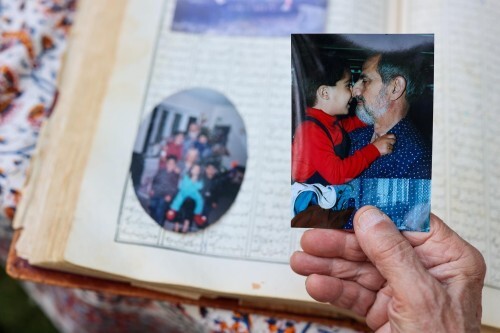
(47/54) “When our grandchildren were born we moved to America to help raise them. First came Ahang’s son Sepanta. Then when I turned sixty we moved into Maziar’s house to help raise his newborn twin boys. And that’s where we’ve been for the last thirty years. The year that we moved in Mitra made me swear an oath. She made me promise that I would die before her, because she couldn’t stand the thought of me being with another woman. Maziar and his wife were doing their medical residency at the time, so most nights we were on our own. Because of Mitra’s hand injury, much of the childcare fell to me. I’d be up all night with one baby in each arm: this one needs a bottle, that one needs a diaper change. When the boys grew a bit older Mitra took over the clothing decisions. She was determined for them to have matching bathrobes. She couldn’t find the exact ones she wanted in America, so she ordered fancy bathrobes from Europe. I was responsible for the physical activities: the wrestling, the hiking, the fishing. In our backyard we built a small garden, and in their quieter moments they would help me tend it. But my most important job was teaching them our language. The vessel of our culture. I wanted to lead them to the source of the spring, so that they could read the words our writers have written. And sing the songs our singers have sung. The Persian alphabet can be difficult, so I didn’t start with letters. I started with words. I chose three hundred words. Simple words, words that everyone should know: 𝘔𝘦𝘩𝘳. Love. 𝘙𝘢𝘴𝘵𝘪. Truth. 𝘕𝘦𝘦𝘬𝘪. Goodness. While we were working in the garden, I’d say them over and over. It didn’t matter to me if anyone was listening or paying attention. All that mattered was that the words were being spoken. Every time we took a long trip in the car, I’d prompt them with the same question: What are the two things that God has given everyone? 𝘑𝘢𝘢𝘯 and 𝘒𝘩𝘦𝘳𝘢𝘥. Soul and Wisdom.”
به آمریکا آمدیم تا در نگهداری نوههایمان کمک کنیم. نخست پسر آهنگ سپنتا به دنیا آمد. شش سال در خانهی آنها ماندیم. با سپنتا از آن روزها خاطرات بسیار شیرین دارم که به هنگام به آنها خواهم پرداخت .سپس به خانهی مازیار رفتیم تا در نگهداری از دوقلوها یاریشان دهیم. آنها برای گذراندن دورهی تخصصی پزشکی به سختی درگیر بودند. میترا مرا سوگند میداد که پیش از او بمیرم، زیرا مرا تنها برای خود میخواست، من هم همین را میخواستم. بسیاری از شبها تنها بودیم. یک شب هر دو کشیک داشتند، شب دیگر هر دو به خانه میآمدند و دو شب دیگر یکیشان در خانه میخوابید. به دلیل آسیبدیدگی دست میترا، بخش بیشتری از پرستاری آنها با من بود. بنابراین شبها را با هر نوزادی در یک دستم میگذراندم، یکی نیاز به شیشهی شیر داشت، دیگری به تعویض پوشَک. هنگامی که پسرها بزرگتر شدند میترا بیشتر مرا کمک میکرد. او میخواست که آنها کُتهای حولهای مشابه داشته باشند. در آمریکا فرهنگ کُت حولهای وجود نداشت، بنابراین از اروپا سفارش داد. فعالیتهای ورزشی آنها با من بود: کُشتی، پیادهروی، ماهیگیری. در حیاط پشت خانه باغچهی کوچکی، به اندازهی نخستین باغچهام در نهاوند راه انداختیم. گاهی مرا در پیرایش باغچه کمک میکردند. اما مهمترین مسئولیتم را در آموختن زبان فارسی به آنها میدانستم. زبان نگهدارندهی فرهنگ است. میخواستم آنها را به سرچشمهی آگاهیها برسانم و با ارزش زبان پارسی آشنا کنم تا بتوانند خودشان واژگانی را که نویسندگان و سرایندگان ما نوشتهاند بخوانند. تا بتوانند ترانهها و سرودهای خوانندگانمان را زمزمه کنند. یادگیری الفبای فارسی شاید کمی مشکل باشد، از این رو با الفبا شروع نکردم. از واژهها آغاز کردم. سیسد واژه انتخاب کردم. واژگانی ساده که هر کس باید بداند: مهر، راستی، نیکی. هنگامی که مشغول کار در باغچه بودیم، آنها را بارها تکرار میکردم. مهم نبود که کسی گوش میدهد یا نه. تنها چیزی که مهم بود این بود که واژگان گفته و شنیده شوند. هرگاه سوار خودرو میشدیم، این پرسش را تکرار میکردم: “بهترین دو چیزی که خدا به همه داده است چیست؟” جان و خرد
Brandon Stanton's Blog
- Brandon Stanton's profile
- 768 followers



